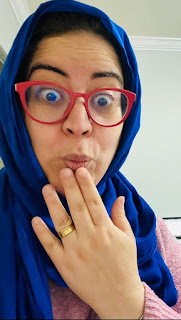Once I was invited to participate in a panel discussion as a Muslim individual.
Someone from the audience asked me to reflect on Prophet Mohamed PBUH's miracles because he couldn't pinpoint any.
I told him that Prophet Mohamed had had many miracles, but as Muslims we don’t focus on how
miraculous he was; rather, we focus more on his message and the legacy he left for us-Muslims.
Then, I added that one of the Prophet's miracles was obvious when his nanny (Haleema Assa'deya) found her yellowish, droopy dry and desert-looking yard turned green as soon as she brought the Prophet to her home. Also, her sick goat got healthier, and
they were able to milk it. Everything she owned was doubled in multiple folds. The Prophet was miraculously blissful.
The Prophet Mohammed was also known for his graceful ability to bless food and make it
enough even if offered in small amounts. One of the stories that was well known at this time was the story of Abu Huraira, the famous Hadith* narrator.
Abu Huraira was so hungry for days, he wrapped a belt with a stone around
his stomach, so he wouldn't feel how empty his aching stomach was. He was poor. Abu Huraira felt too ashamed to ask someone to invite him over for a meal. He met the Prophet while
he was sticking around. Abu Huraira passed by Abu-Bakr at first, then Omar Ibn-Elkhattab next (both of which were
the Prophet's companions); he tried indirectly to let them know that he was
hungry, but they didn't get it. When Prophet Mohamed PBUH saw him, he read his mind and immediately realized that Abu Huraira was starving. He invited
him over some milk, and right before Abu Huraira responded, he told him to go
and invite the people of Suffa.
Abu Huraira got disappointed because he was assured that the Prophet’s bottle of milk wouldn't be enough for neither him nor the Suffa group of people, who were about 300-400
members.
Abu Huraira thought that he would never get a chance to fulfill his
hunger, but he went on as instructed and went to invite the Suffa group like the Prophet
asked him to do. Then, the Prophet offered the gathering the milk, and they all drank. It was blissful and enough for all!
Abu
Huraira drank the milk, and he said, "It was so filling, it felt like even if someone poked me with a pin, I would be oozing out milk." He referred that the
Prophet blessed the food and made it enough for all people despite its small quantity.
The Prophet Mohammed was able to talk to animals and predict events before happening. He, peace be upon him was able to travel to Quds on a miraculous animal, and it only took him a few hours to travel ( during Israa and Miraj trip), which seemed impossible in ancient times as people would rely on camels to travel, and they would need months to travel from Mecca to Quds. Also, one of the
miracles was the moon splitting.
I believe that the most obvious miracle was that despite that the Prophet was illiterate, he could memorize and recite the Holy Quran (+6000 verses).
Narrating the past Prophetic stories and telling the future stories was itself a miracle. I should point out that the Holy scripture's Arabic language is a very rich and eloquent language. Formal Arabic in the Holy Quran is different from informal or slang Arabic. There are seven Arabic dialects, by the way.
People at the Arabian peninsula used to brag about their linguistic skills
and rich Arabic language, and the more poetic verses you could memorize, the more eloquent you would have become. Ancient Arabs in Mekka would hang their poems on the Kaaba* walls out of pride. The verses could go longer
than 1000 verses.
Back to the panel discussion, I would say that the time was limited and I was speaking as a panelist for the first
time in my whole life, I was panicking. And guess what? I said the Prophet was literature instead
of saying the Prophet was illiterate. 🙈🙈🙈🙈
One of the attendees, who was also a non-English native speaker, corrected me publicly. I felt like I was swallowed and sinking deep in shame, my heart was pounding out of embarrassment!
After the talk was done, I wasn't able to think about anything but my grammatical errors. Sigh!
I thought to myself in so much self doupt, what else have I done or said wrong?
I tried to distract myself by mingling with other attendees. A few minutes later, an American blond teen girl came and asked me, "There is one word you said, and I didn't understand..."
OMG! could that get any worse!
I smiled despite my embarrassment and asked her what this word was. She said, "Polytheism. What does this word mean? And you said monotheism, what does it mean?"
I smiled in relief and said, "Monotheism is worshipping one God, and polytheism means worshipping a plethora of deities?"
Phew!
"You mean, multiple Gods?" she asked.
"Yes. Exactly," I said.
Oh, God!
I remember someone wise once said that when someone mispronounces a word, that means she learned it by reading.
If someone asked me, "What was Prophet Mohamed's miracles PBUH?" in Arabic-my mother tongue-I would probably say more
than I could say in English.
Assuming that people could fully express their ideas in their second language because they have a light accent, or they are so familiar with
the culture they live in is probably wrong.
Let's see how to imply this in the Arabic language...
It’s time for your Arabic 101 class🤓…
Let’s just say that someone is named Rose.
The Arabic transliteration would be “Warda”.
The Arabic translation would be
“Flower”
The proper language localized translation would be
Someone named Warda
There is a significant difference between translation, which is what you said literally,
and language localization, which is what you intended to say, and transliteration,
which is how you pronounce it.
So, dear readers, whether you’re a fluent speaker or a native language speaker, and my Arabic-speaking fellows, make sure to go easy on someone wanting to cross-cultural barriers, be their helper. Be a good ambassador!
In Solidarity…
My thoughts represent me and are not affiliated with any organization I work/ volunteer for.
Hadith*: prophetic statement.
Kaaba*: the holy cuboid structure where Muslim do the ritual of pilgrimage.
Wanna say something? Email me!
Check out my Books on Amazon
Check out my Soundcloud
Youtube channel




